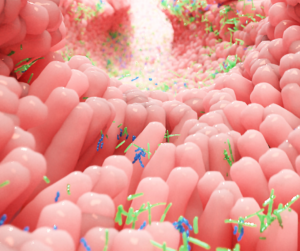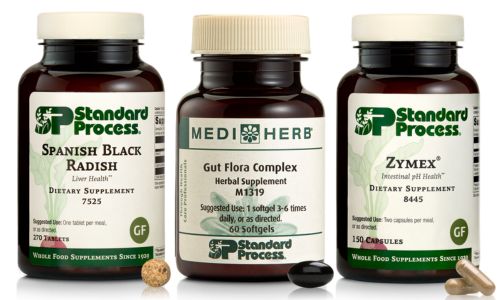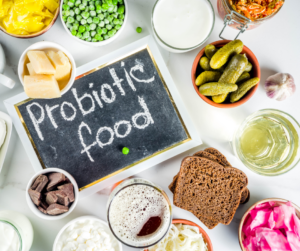By Claire Bacon, ACN, CNC
Yeast and fungal overgrowth affects the body in more ways than we realize. Do you suffer from food intolerances? Chronic fatigue or cravings? Or skin conditions like eczema or acne? If so, your gut microorganisms may be out of balance. Now is the time to take back your life and clear the unwanted microorganisms out of your gut.
Did you know, millions of bacteria reside within our intestinal environment. They build themselves colonies protected by biofilms. Funny enough, these colonies feed on simple sugars and carbohydrates. Yet another reason to avoid sugar and carbs! Over time, this can weaken our immune system. The key to restoring balanced gut health is to break down the biofilms, clear out the detrimental organisms, and promote beneficial strains in the gut.
Your gut could be unbalanced if your digestion is giving you problems. Do you feel very bloated shortly after eating, or later in the day? Do you feel foggy and have trouble working through analytical tasks? Have your bowels been off? With these questions and more, an imbalanced gut can lead to you experiencing any number of other health issues.

5 Signs Your Gut Is Out Of Balance:
It is imperative to listen to your body and make the necessary changes, as soon as possible. Unfortunately, chronic imbalances can get serious over time. Following are the most common signs that your gut is out of balance:
1. Digestive Discomfort
Things like bloating, gas, constipation, and acid reflux can be symptoms of an imbalanced gut. Oftentimes, lacking the right beneficial bacteria in the stomach and intestines will impair proper digestion. In addition, having excess amounts of microorganisms at the wrong places in the digestive system can cause major bloating and upset. A balanced, healthy digestive system will have less trouble processing and absorbing food, and getting rid of the waste.
2. Constant Fatigue
Of course you know, being constantly tired can be a sign of deeper issues. The diverse bacteria within your gut are responsible for many functions, including producing energy. But with yeast or fungus imbalance, these functions are impaired. The detrimental microorganisms are literally stealing your nourishment, and your energy.

3. Unexpected Weight Change
Gaining or losing weight without a change in exercise or diet can be a sign of an unhealthy gut. You may experience difficulties with regulating blood sugar, absorbing nutrients from food, signaling to the brain that you’re full, and storing fat more easily. Sadly, yeast and fungal overgrowth can impair the delicate balance of hormones that regulate our weight.
4. Certain Skin Conditions
They say, “the skin is the window to the gut.” Gut health affects everything, even the body’s largest organ, which is the skin. Certain conditions like acne and eczema have been linked to inflammation in the gut. When the gut is unbalanced with excess yeast and fungus, overpowering the good bacteria, the protective gut barrier gets damaged and permeable. This permeable gut lining can show up as irritations, redness or rashes on your skin.
5. Mood & Anxiety
The gut is often referred to as the second brain. Indeed, a gut that is not functioning properly can have trouble producing calming neurotransmitters and serotonin, which is a hormone that affects sleep and mood. This ultimately affects your ability to have a good night’s sleep. Research has shown that depression, mood swings, anxiety, and emotional health are tied to the current state of your gut.

5 Ways To Fix An Unbalanced Gut:
If you’re experiencing one or more of the signs listed above, it’s time to start making changes to balance your gut. Here are some easy lifestyle tweaks you can do:
1. Change Your Diet
Diet has a huge impact on maintaining a healthy, balanced gut. Making changes like avoiding processed and high sugar foods can lead to a healthier gut. If you can, aim for a diet that includes lots of fresh produce and some whole grains, for natural sources of soluble and insoluble fiber.
2. Get More Sleep
Promote a healthier gut by getting more sleep. Sleep deprivation can lead to a decrease in good gut bacteria over time. Preliminary evidence indicates that microorganisms and circadian genes can interact with each other. It’s certainly a vicious cycle, so it’s important to get your rest.
3. Avoid Stress As Much As Possible
Easier said than done, right? Yet, reducing stress can help protect your gut microbiome. Even small things like yoga, getting a massage, or other things that make you happy can reduce stress hormones. This allows your gut to produce more serotonin and dopamine.
4. Avoid Unnecessary Medications
Taking unnecessary medications can aggravate issues you’re having with your gut. Some medications are absolutely necessary and serve a purpose to your health. But if you’re only masking a symptom and not fixing the problem, you might do better with another strategy. Addressing the root cause can fix the problem, once and for all.
5. Take Supplements
A great way to accomplish change is to add the right supplements to your daily routine. Dr. Bacon and our Nutritional Consultants can help customize your recommendations.
Favorite Supplements To Balance Your Gut:
Taking daily supplements can provide herbs and nutrients we wouldn’t normally get in our diet. Three of our best whole-food-based supplements are:

- Lactic Acid Yeast is a beneficial yeast that counteracts Candida overgrowth. It’s wonderful to help with gas and bloating if you’ve had too many carbohydrates. And, it’s a chewable wafer that’s easy for kids to take, as well!
- Spanish Black Radish provides a high concentration of sulfur, which acts like a fumigator, clearing out unwanted yeast and promoting liver detoxification. Available in office.
- Gut Flora Complex is back!! One of the most powerful products for gut support, Gut Flora Complex includes oregano oil (like a natural antibiotic), plus Anise, Andrographis, and Phellodendron. These herbs work by cutting down on overgrowth of pathogenic bacteria. Available in-office only.
- Zymex – we usually think of this one after someone has gone through a period of taking antibiotics. Zymex helps return the gut environment to be a good place where probiotics can live. Comes in chewable wafers or capsules.
Bonus Supps…
Of course, we have many options when it comes to fixing your gut. That’s one of the reasons we love muscle testing in the office – to figure out what’s good, better, or best! These products are also some top performers…
- Garlic Forte is a powerful support for your gut because its naturally antimicrobial properties can kill off so many unwanted things. Garlic provides sulfur for detoxification pathways, and is also anti-inflammatory for the heart and cardiovascular system. It’s great if you’re dealing with blood pressure issues, too!
- Cat’s Claw Forte is used to cut down on yeast colonies within the small intestine, and reduces allergy symptoms from high histamines and mast cell activation. Available in-office only.
- Berberine Active is useful for antimicrobial purposes, and for regulating your blood sugar levels. It’s one of the best for leptin- and insulin-resistance!
Maintain with Living Foods in Your Diet
Once the unwanted microbes are cleared out, you can start encouraging better microbiome diversity. The easiest way is through consuming non-dairy probiotic foods like Coconut kefir, Kombucha tea, cultured vegetables, or raw, fermented sauerkraut.

In Conclusion:
If you are wondering if yeast overgrowth could be the root cause of your symptoms, make an appointment with Dr. Bob to start taking back control of your life. We hope these tips help you bring balance to your gut!
Contact our office with any questions about these supplements. Remember, you can also place an order online!


